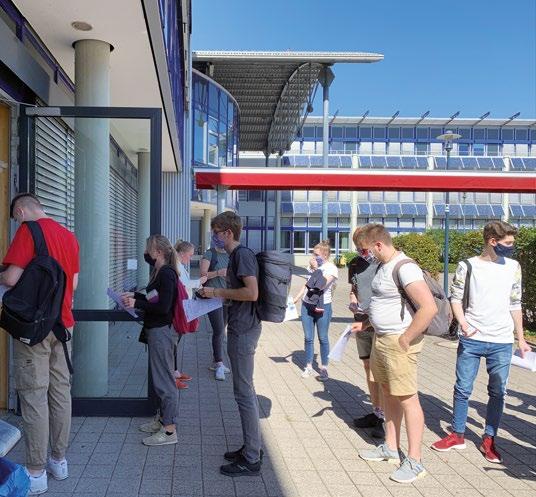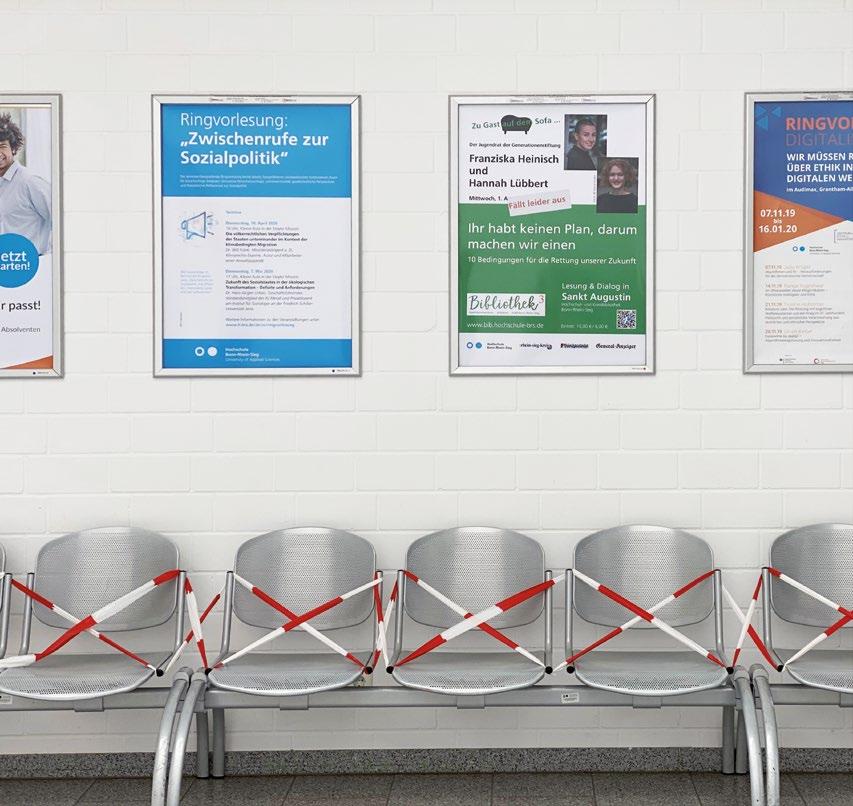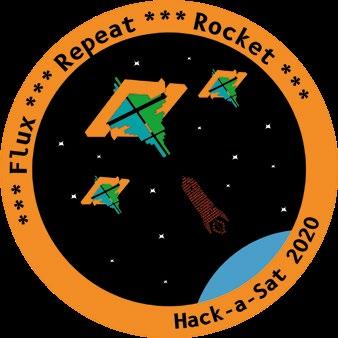
8 minute read
… keeps her stance on sustainable research and teaching
How the pandemic changed the university
Students on campus – a rare sight during the past months “Spread science, not Corona” – is the slogan H-BRS chose to promote a responsible approach to the pandemic. Anyone who wanted could also wear this slogan on one of the university’s own protective masks, which were available for purchase via the webshop and in the library. But disseminating knowledge and science is no easy task when lectures and seminars, close cooperation in laboratories and libraries are not possible. Maintaining operations in research and teaching and switching to digital alternatives required quite a bit of effort.
Especially from the 15 employees of the Institute for IT Service (ITS), the university’s computer centre. At the beginning of the pandemic, when schools and kindergartens were closed and working from home became the new norm, they ensured a smooth transition and were appreciatively dubbed “IT Boys” and “IT Girls” by their colleagues. “The team worked brilliantly hand in hand”, praises Institute Director Professor Stefan Böhmer. “The devices were programmed quickly as if on a piecework basis to guarantee that work within the secure university network was also possible remotely”. By means of a service laptop and an Open Virtual Private Network (VPN), everyone who urgently needed access could obtain access to the digital files and records that were normally readily available otherwise. Each employee also received a short individual training session on how to set up the devices at home.
Achievable but challenging
Teaching in the summer semester of 2020, jokingly referred to as the “coronamester”, presented all those involved with major challenges. “It worked better than expected, but overall it was very strenuous and impersonal”, was the tone of a non-representative survey amongst professors and lecturers for special tasks at the university. They also observed that preparing so-called asynchronous courses took notably longer than preparing for standard face-toface teaching. Producing a teaching video, for instance, could easily turn into one or two days of work. Even holding a lecture from home at the kitchen table requires a lot of communication with the students afterwards via email or in the online course forum.
The additional work was nonetheless worth it, says Professor Iris Groß, Vice President for Teaching, Learning and Further Education until September 2020. “We will definitely benefit in the long term from digitally produced teaching content, which will also be useful to students in the future for preparing and reviewing. And the university’s e-learning team received helpful feedback on new learning formats from some professors. Max Leitterstorf, Professor of Business Management, for instance, relied on screencasts during the pandemic. These are teaching videos in which both he as lecturer and PowerPoint slides being presented in parallel can be seen. “The feedback from the students was very positive”, says Leitterstorf. “Many have used the videos for class preparation or follow-up, and almost all of the students resort to them to prepare for exams.” Robert Grüter, Professor of Logistics and Supply Chain Management, got involved in the discovery learning experiment. In this method, the students are presented with a problem via video once a week, which they are supposed to solve with their own ideas and submit. Only then does academic input and online discussion of a sample solution take place. “In my opinion, it is very important for students to acquire independence and personal responsibility even in the first semester”, Grüter explains. “That’s exactly what this concept encourages.”
Despite all the creative and technically sophisticated solutions, the bottom line was that the crucial element was missing – direct contact with the students. In video chats, many of them kept the camera and microphone switched off. The lecturers criticised that they lacked instant feedback, such as clearly recognisable reactions and questions. A video clip from the Department of Natural Sciences put it in a nutshell: “We miss you!” was the message to the students.

Not just playing
“Capture the Flag”, or CTF for short, is the name given to competitions such as the Hack-a-Sat, in which hackers compete against each other, always with the aim of protecting a computer or a network from another team. While this has a playful character, it also trains professional skills. “Hackers possess core competences of computer scientists. They should be able to familiarise themselves with unknown systems quickly”, explains doctoral student Ruben Gonzalez. For this reason, experienced CTF players are eagerly recruited by the security industry he says. Thus, participation is worthwhile beyond a purely sporting perspective.

Hacker competition in space
H-BRS team takes third place
Hacking a US Air Force satellite is actually a criminal offence – but sometimes you are officially invited to do it. This was the case in August 2020, when eight teams attempted to take a photo of the moon with the camera of a real satellite in orbit during the finals of the Hacka-Sat competition. Amongst them were six students from H-BRS, who placed third in the final round as part of the FluxRepeatRocket group.

Successful amongst 1,200 teams
“We were the only German team to make it to the finals”, says Ruben Gonzalez. He is a doctoral student at the university and founded the six-member hacker team RedRocket in 2018. His fellow competitors are students Aaron Kaiser, Lukas Kempf, Gina Muus, Manfred Paul and Jan-Niklas Sohn. For the international competition, the computer scientists from the Sankt Augustin campus teamed up with students and researchers from Ruhr-Universität Bochum, RWTH Aachen University and FH Aachen University of Applied Sciences. Amongst 1,200 competing teams from all over the world, they made it to the top eight in the preliminary round in May 2020. The reward was a CubeSat satellite and 15,000 US dollars in prize money. The final in August was supposed to take place at the Defcon hacker convention in Las Vegas. Due to Corona regulations, the organisers mailed the necessary equipment to the finalists instead, in RedRocket’s case to the TechnoPark in Sankt Augustin. A model of the satellite was delivered in order to first analyse and test the system. In the second part of the competition, the teams had to access a real satellite in orbit with a self-written code, change its orientation and take a photo of the moon with the integrated camera. Calculating the satellite’s rotation was particularly tricky but necessary to get into position for the photo. Postal delivery problems posed yet another hurdle. The German team did not receive the training satellite until three hours before the competition started. “Otherwise, we may have placed higher than third”, says Ruben Gonzalez. But even that still brought in 35,000 euros in prize money.
From H-BRS to Silicon Valley
ALUMNUS IN THE SPOTLIGHT
The interdisciplinary degree programme prepared alumnus Fabian Meier for Apple and Silicon Valley
Cloud computing teams at Apple work to provide customers with world-class services such as iCloud or Siri. As an internal consultant to these teams, Fabian Meier, Senior Cloud Solutions Architect, mediates between two worlds: technology and business. He acquired the foundations for this job at Hochschule Bonn-Rhein-Sieg, University of Applied Sciences. “In my interdisciplinary degree programme, I gained a highly sought-after skillset through the combination of computer science and business administration. My studies have prepared me well for the challenges I face today. On the one hand, I understand what is important for reaching corporate goals, and on the other hand, I speak the language of the developers and engineers who do the work to achieve these goals.”
Fabian Meier sees his intercultural competence as another success factor in his role at Apple. After all, he works in Cupertino, California with people from all over the world on technologies for people all over the world. He acquired his intercultural thinking through stays abroad such as the H-BRS summer school in Canada. One insight: “People are very different depending on how and where they grew up and where they are in life in terms of their own values, norms and goals. The better you understand that, the better you can work with others”. The effort is worth it, says Meier, “You can’t be successful as a loner, you need to cooperate with other people. Even icons like Steve Jobs and Elon Musk had to realise that”.
Moving forward with passion
Fabian Meier’s path to Cupertino began at the start-up Recommind in Rheinbach. He started there as a 17-year-old pupil, worked for the company during his A-levels (Abitur) and university studies, and later in Australia and Boston, amongst other places. His last stop was the Recommind headquarters in San Francisco. After 14 years with the software provider, the business informatics specialist made a cut and handed in his notice – without a new job. “I felt I had been in the fast lane for far too long”, he recounts, “I was always jumping at the next opportunity, partially living out of a travel bag. It was too much at some point”. At the age of 32, he decided to take a step back and reorient himself. He wanted to focus on tasks where he could make a difference and on people who would influence him positively. So, after nine months, he was ready for the new challenge at Apple. He therefore advises students, “Life is far too short to hold on to something you are not really passionate about or to let detractors drag you down”.
More: www.youtube.com/ watch?v=MkSioXDGzzE&feature=youtu.be Business informatics specialist Fabian Meier advises students; “Fill up on life experience and spend some time abroad. That’s just as important for your career as your studies”.










